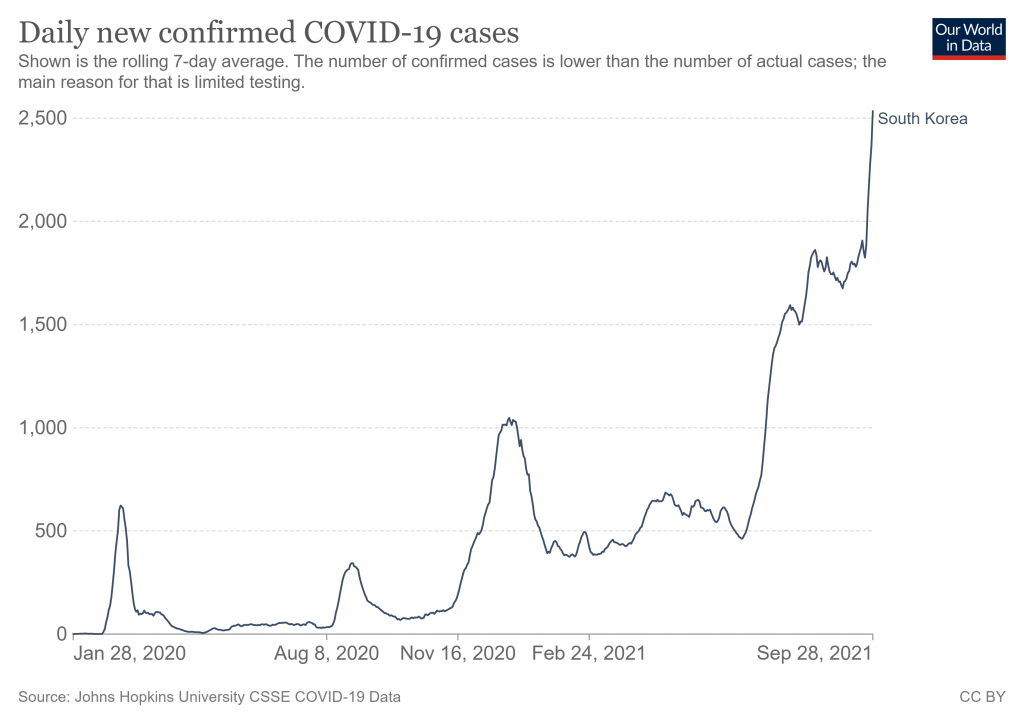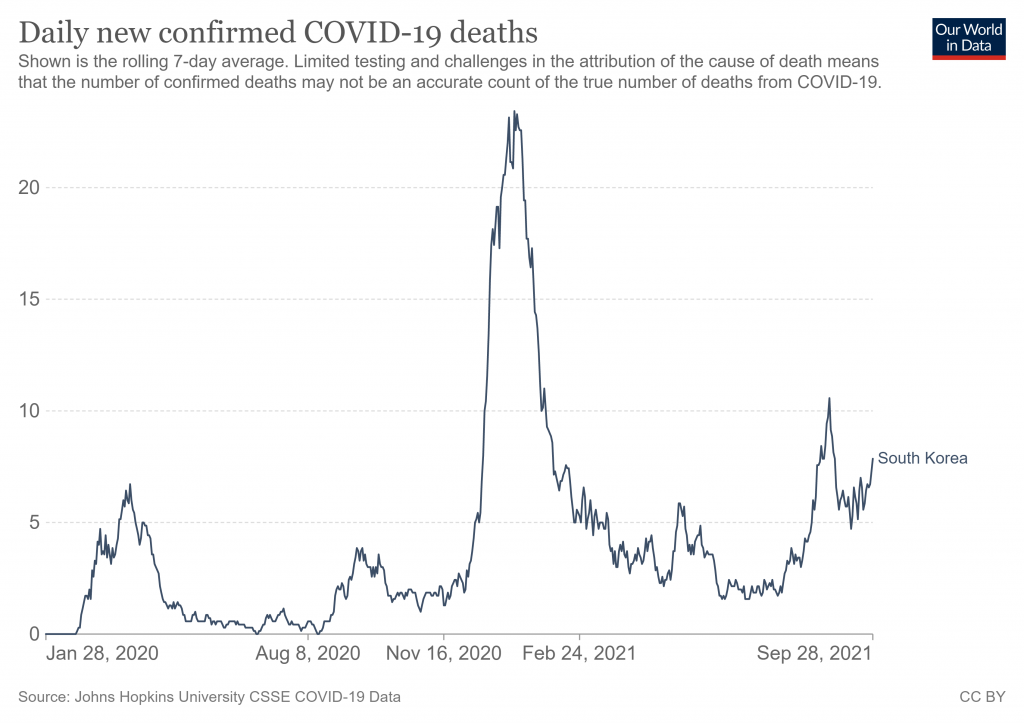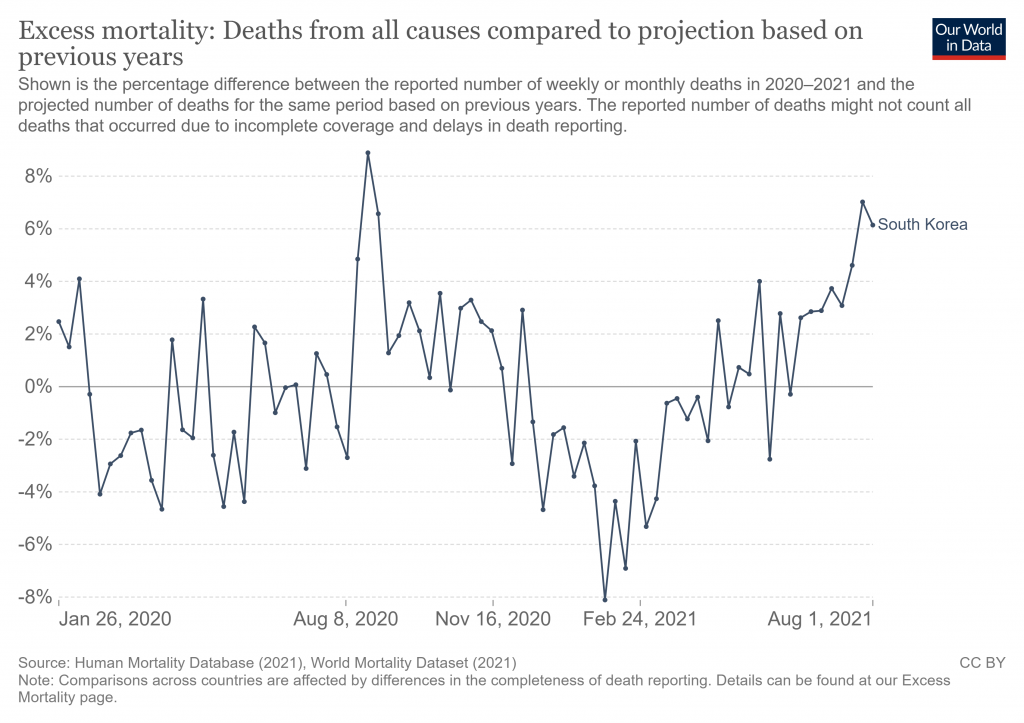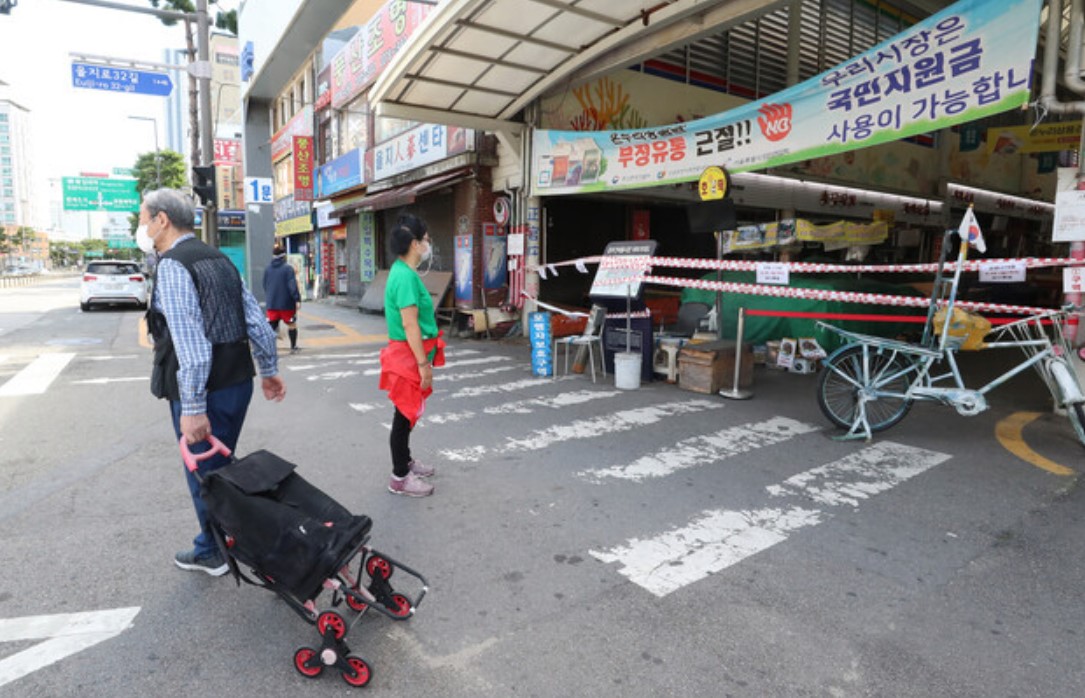In the U.K. we are facing threats once again of restrictions and vaccine passports being imposed over winter should the prospect of an ‘overwhelmed’ NHS be sounded by the Government’s medical advisers in the coming weeks.
But how realistic is this threat of health service ‘collapse’? South Korea is currently providing an object lesson in how the concept appears to be very much in the eye of the beholder.
The South East Asian country has been experiencing a spike in reported infections in recent weeks as the Delta variant has become dominant, hitting over 3,000 in one day for the first time on September 24th.

Three thousand ‘cases’ is very low, of course, compared to our 30,000 or so since early July, and the country is similar in size to the U.K., with a population of 52 million to our 67 million.
While the country does do less testing, deaths are also very low, with daily confirmed deaths currently between just five and 10 a day.

Excess mortality has also remained low throughout the pandemic, currently sitting at around 6% having been negative over the winter.

Despite these enviable Covid stats, though, the country is currently living under various Covid restrictions and the Government has said that while it plans to reopen, it will reverse course should ‘cases’ go above 4,000 per day. Why? According to the Government’s Minister of Health, Kwon Deok-cheol, the South Korean “healthcare system would not be able to cope with 4,000 or 10,000 new confirmed cases per day”.
At a Korea Broadcasting Journalists Club roundtable on Tuesday, Minister of Health and Welfare Kwon Deok-cheol said that South Korea’s medical response system would be “sufficiently capable” of handling a daily caseload of 3,000 or more confirmed cases and that the country would be able to proceed with a gradual return to everyday life, provided that the Government’s late-October targets of fully vaccinating 80% of adults and 90% of senior citizens are met.
He also said that the shift toward a “living with Covid” approach was not hasty, noting that while the U.K. began its gradual return to normal life while its full vaccination rate was just 1.6%, whereas South Korea had a full vaccination rate of 46.6% as of Tuesday.
But he also noted that observation of basic disease prevention guidelines such as wearing masks indoors and regularly ventilating indoor spaces would remain necessary, saying that “our healthcare system would not be able to cope with 4,000 or 10,000 new confirmed cases per day.”
“For that reason, we are considering a phased easing [of restrictions] – based on business types, for example – rather than a full-scale elimination [of said restrictions],” he added.
Vaccine passports are also being considered, apparently in order to protect the unvaccinated.
The South Korean government similarly explained that with the 976 critical care beds and 10,212 beds for patients with moderate symptoms that it had secured as of Tuesday, the South Korean healthcare system would be able to cope with as many as 3,500 new confirmed cases per day.
In addition to relaxing restrictions on private gatherings for fully vaccinated people and gradually removing restrictions on the use of multipurpose facilities, Kwon also said consideration was being given to the adoption of “vaccine passes,” where only fully vaccinated people or other restricted categories of people would be allowed to use certain establishments during the initial stages of the gradual return to everyday life.
He went on, saying that Germany grants permission for indoor events or use multipurpose facilities such as hospitals, long-term care facilities, nightlife establishments, and cinemas only to people who present a pass that certifies they have been either fully vaccinated, have tested negative for Covid, or have fully recovered from a previous Covid infection.
“With confirmed cases currently being observed among unvaccinated people – many of them leading to critical symptoms and even death – we are considering applying such an approach, if only to protect these people,” he said.
I have to say it is bizarre to read the same worries about ‘cases’ getting too high and putting unsustainable pressure on the health service in a country which is experiencing a fraction of our reported infections and an even smaller fraction of our deaths. How can we take this seriously when South Korea has more than three times the number of hospital beds that the U.K. has, 10 per 1,000 population compared to three per 1,000?
Nations whether in the East or West are now being held hostage by their health services and their supposed capacity to cope with coronavirus surges. But it’s clear from the very different scales of these supposed capacity threats in different countries that this spectre of an overwhelmed and collapsing health service is largely a figment of the political imagination.
No doubt a winter Covid wave can stretch a health service considerably. But if even England in January had thousands of empty hospital beds on January 18th, when the number of Covid hospital patients hit 39,254, and did not ‘collapse’ (and the Nightingale hospitals remained empty), then it’s difficult to see how the threat is in any way a realistic one. At that winter peak, Covid patients occupied less than a third of the total hospital beds (31%), while 8,696 beds remained unoccupied. Besides which, if winter hospital capacity is the crucial issue for lockdowns and other measures, would it not be a whole lot cheaper and more effective just to boost it more?
Lockdown proponents will claim that the U.K. winter wave was mitigated by restrictions. But the truth is the U.K. suffered one of the biggest winter surges in the world, regardless of what measures were in place in other countries. States in America with few or no restrictions such as Florida and South Dakota, and light-touch Sweden, did not suffer worse winters. There is thus nowhere that lockdown proponents can point to and say, look, that’s what would have happened here if we hadn’t locked down. There is no reason to think that without restrictions the U.K.’s winter surge would have ended up much worse.
While governments around the world continue to hold the threat of an overwhelmed health service over their populations as a kind of political blackmail (albeit often sincerely believed), the experience of South Korea shows that the threat is ill-defined, largely illusory, and not a sound basis for imposing illiberal measures and ruinous restrictions.












To join in with the discussion please make a donation to The Daily Sceptic.
Profanity and abuse will be removed and may lead to a permanent ban.
I’ve had a bad start to the day:
Finally! Medical Proof the Covid Jab is “Murder”
How Many People Are the Vaccines Killing?
No-one to talk to. This is utterly depressing.
Most people here are listening sympathetically.
Your links aren’t working. I would be interested in seeing what you were intending on linking to. Could you reply with the links fixed please?
Backfire? Really? I can’t wait.
How?
I don’t believe a word YouGov polls say (any more than any others). Questions are loaded and those invited to respond to political issues are skewed to get the result they want.
What is an “accurate” poll when polling results are used as propaganda, which is to say tools against independent thought, on the very issues that punters are being polled on?
As they say, “Anything for you, Guv.”
That is one reason why I wouldn’t take part in a poll of this type.
I’m sure the real rulers have much better sources of information about the public mood and are not conning themselves so extensively. Bias towards people saying things they think they should say or that make them seem public-spirited has been known about for a very long time. From memory I think it’s mentioned in Ogilvy’s “On Advertising” with reference to George Gallup and asking people if a Shakespeare play was staged in their town would they be likely to go to it? To return to what I said in the first paragraph: this understanding is USED in influencing minds. Robert Cialdini covers it too in his book “Influence”.
PS Love the bit about YouGov’s partners at Imperial College.
As a panelist who in 2020 said he was ‘not frightened at all by Covid’, I have NEVER been asked about the rightness or wrongness of government Covid policies. Filtered out. I carry on, with the (very) distant goal of some lolly, but I am under no illusions about the falseness of online polling.
Heard on Talkradio – we need time to find ot about this virus – how it responds to vaccines.
Seen on Talkradio – newspaper headline, government rolls out booster vaccine to save us from the virus.
Which, if any, is true?
None of it. This is a pandemic of lies.
The Swiss results indicate that the psyops are perhaps more important than the skewed polling.
The Swiss voted with 61% turnout to give their government the power to prevent unvaccinated citizens from accessing certain public places by 2/3rds.
The psychology of the Ash tests where in a group roughly 80% of people will go along with a group in the face of contradictions to reality seems to go well with the 20% that will be very difficult to coerce without convincing arguments.
Thats probably where we are and where we will stay depending on the culturally and historically specific factors of various countries. So in the UK we are pretty close to 20% minimum where people here have largely forgotten the lessons of history and the legacy of struggling for freedom and are not really reinforced in the educational system which has done a generational shift towards leftist collectivism.
The US split as it is geographically and culturally has closer to 50% who will not give in with a stronger culture of freedom. Similarly many recently freed Eastern European countries will have a good 35-45% of people refusing to be coerced.
Whatever the case, the populations that will not submit are sizeable which can only mean that we will either see nation states back down short of concentration camps and violent forced injections, or we will see massive violent civil wars.
“The real hopeless victims of mental illness are to be found among those who appear to be most normal … They are normal not in what may be called the absolute sense of the word; they are normal only in relation to a profoundly abnormal society. Their perfect adjustment to that abnormal society is a measure of their mental sickness. These millions of abnormally normal people, living without fuss in a society to which, if they were fully human beings, they ought not to be adjusted.” – Aldous Huxley
‘Governments and media have now spent nearly two years telling the public, every single day, that Covid is an existential threat beatable only via strict and universal adherence to difficult rules. They’ve also told people explicitly that they have a civic duty to repeatedly volunteer for experimental medical substances. Thus questions about this topic are more or less perfectly calibrated to hit the weak spot of modern polling methodology.
Politicians would thus be well advised to treat these polls with enormous degrees of caution. Imposing draconian and violent policies on their own citizens because they incorrectly believe that fanatically devoted volunteers are representative of a Rousseau-ian ‘general will’ could very easily backfire.’
Given these tyrants’ unlawful and monstrous actions and decrees over the last two years, would it not be poetic justice and beautiful if their attempt to coerce/force their citizens to be injected with a novel and experimental substance does indeed backfire due to overconfidence in ultimately erroneous polling, and an innumerable mass of people rise up and physically (yes, physically) remove these criminals from office?
I think this is where we are headed. They, these snakes behind the curtains, have more tricks to play however. But they are having difficulty gushing our reactions especially here. Boris is way behind the goals which is why he is being threatened with ejection. If he goes, probably in the Spring, the replacement will be substantially more like Dan Andrew’s and then things will get trully dark.
At that point we had better get the pitchforks, baseball bats out and go straight to Parliament.
How odd that their are two chat threads for this article, one for those who go through the clipped article from the DS front page, and one from the main article?
“YouGov Chat polls aren’t actually the polls that YouGov do press releases about, which are done via entirely different platforms and methods. This is more like the sort of poll you might find on a newspaper website.”
Thats the point, politicians are influenced by the general mood music of the day, a massive amount of which is created by the media. If they read polls in their paper (or see it quoted on some schlock news TV/radio program) that say ‘The Public wants more lockdowns’ they aren’t going to dig deep into exactly who did the poll and what the methodology was, they’ll just get the general message ‘Controls are popular and might help me get re-elected’.
The thing is they aren’t just a little bit wrong. They are massively wrong. One day before the first mask mandate came into effect, I was out in Wimbledon high street. The public were aware masks would be mandatory the next day. They were all aware of the argument they were being made mandatory “for our own good.” Most of the public would have purchased their masks in advance knowing, technically, they were not even allowed in shops to purchase them the next day. Yet fewer than 15% of the public were wearing a mask. The government claimed polling showed 80% of people agreed masks should be worn.
It would be interesting if it is possible to go back to that day and retrieve some CCTV footage, because I can assure you my <15% figure is accurate: I was counting people as queued at the major road crossing outside the shopping centre Centre Court.
Of course there is a difference between agreeing masks should be worn and actually wearing them when it is something you are not used to. But on the other hand there was also there was hyper awareness of the pandemic and at this point we must have been at peak “social volunteering”. So the difference between the numbers indicated by behaviour and indicated by the government, is really far too big to be anything like explicable by a simple bias effect.
I remember thinking, either the pollsters are biddable and give a commissioned result, or people don’t like expressing their true feelings if they are not socially minded, or polling method is fundamentally flawed, or the government are outright lying to us, or all of the above.
So given the reality of this difference between what opinion polls were finding, and what people actually think as expressed by the irrefutable litmus test of their actions, I now get very annoyed and frustrated when I hear ministers quote polling. It now feels like yet another example of the public being gaslit and nudged by the government. I suspect the only thing that can now begin to deflate my contempt for the weakness of politicians is if another Maggie leader type character comes along. But there’s no sign whatsoever of that happening in relation to anyone in any of the main parties. None.
I am surpised there is no mention of YouGov’s founder Nadhim Zahawi. Have a look on Wikipedia. I wouldnt trust anything that had his name on it.
No mention of it because it seems irrelevant. It’s not just YouGov reporting high figures for these questions (though theirs do seem higher than Savanta ComRes). The only problems I can detect with how the polls are done are methodological and would affect any polling firm. Moreover Zahawi founded YouGov a long time ago and has been an MP for many years by now. Any claim that there’s a link between him and skewed polling results would not only require evidence the polls are being deliberately tampered with, but also that he’s the one causing it to happen – otherwise it’s just nasty mudslinging against innocent people. But as far as I know, no such evidence exists.
This is a much better analysis of sample bias than the comfort-blanket response that all polls that have results you don’t like must be bent.
This is the real truth – ‘opinion’ is malleable in a multitude of statistically definable ways. Some of this distortion may be deliberate – but a hell of a lot is just basic sloppiness.
My experience of yougov is they freeze you out if answers are outside their desirable range. At about the 2500 point stage you get hit with multiple data validation questions which lead to being dropped from the panel. You are never told this but poll invites just suddenly stop.
But it has to be said that a lot of people just believe the government. They are trusting innocents who are unaware the foxes are running their hen house. If the government says there is a pandemic they do as told because the government said so.
Its hard to accept but i believe its the reality and takes a lot of evidence to the contrary to change their view. Its like the old joke about why is there so little crime in Japan? Because its against the law.
I’m one of those people who do online polls. I do them largely because while I was working, I used to commission surveys from Ipsos Mori and YouGov quite a bit, and I became interested in who was actually filling out the surveys we were paying for.
Oddballs, mainly. The rewards paid may be small but I suspect are a substantial incentive for some people, which further skews matters. The main issue for me is the number of “closed” questions being asked – eg a repeated one is “how scared are you of catching Covid?”. This gives only the option to say you’re scared or very scared or extremely scared, with no option to give a more nuanced view that while having no wish to be ill, I don’t think it’s anything to be scared of for most people (incidentally, the same pattern of questioning is used for anything related to climate change). I am sure that in the commissioning meeting the bias of the commissioner (ie the Government) is obvious, and the polling agency delivers the survey output information knowing it will do the trick – it is what they have found, using their flawed methods, but there is no incentive to go any further. Heaven forbid they should go after the truth….it’s well known we can’t handle the truth.
The whole yougov poll is a joke! I signed up for it ages ago and put down I was unvaccinated then after a few polls they stopped sending me messages to join the polls. So When I started putting down my status as vaccinated I got more polls in to start with then again, as my answers werent what they wanted, I got dropped again and now have to actively seek out the covid related polls and try and share them as widely as possible. It is not a true indication of the Uk population and definitely not above board!!
I can prove that not only YouGov are liars but so is the Gov. Every week we get this old nutmeg from the Gov that ‘80% of the people want to retain masking and social distancing’.
Every Sunday weather permitting I go to two car boot sales some 20 miles apart. They are very large affairs with 1000s of prospective buyers. They are glorious and uplifting affairs because people are happy. There is perhaps 1 mask for every 1000 people there, social distancing is unheard of, people chat and laugh amongst each other, you know , like in the olden days (2019). Now I would call this a good cross section of society, not in one place but in two. So I would rather believe what I see rather than people who have lied to us from day 1.Go yourselfs and enjoy.
Polls are not designed to reflect public opinion, but to manipulate it.